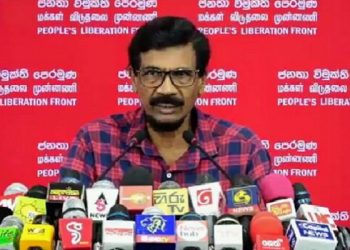The general secretary of Sri Lanka’s Janatha Vimukthi Peramuna (JVP) appeared to be stoking doubts about the island nation’s deal with the International Monetary Fund (IMF), when he made a questionable claim on Sunday that the multilateral lender’s proposed 2.9 billion US dollar bailout package will amount to pittance.
Tilvin Silva, general secretary of the twice-revolutionary Marxist-Leninist party which now leads a small but popular opposition coalition, said speaking at a rally on Sunday September 18 that Sri Lanka cannot resolve its ongoing debt crisis with more debt.
“The government of [President Ranil] Wickremesinghe and the Rajapaksas has decided to rely on the IMF. The plan is to overcome this crisis by obtaining a loan from the IMF.
“Our country’s crisis is debt. Can a crisis caused by debt be solved by a loan? If the crisis is debt, can the solution be debt? No, it cannot,” he said.
Silva was commenting on the IMF’s recently announced staff-level agreement on a 48-month Extended Fund Facility (EFF) for the crisis-hit Sri Lanka amounting to roughly 2.9 billion dollars, pending IMF board approval.
“A 2.9 billion dollar loan has been proposed — yet to be approved by the IMF board — for four years. That’s 725 million a year, or about 360 million per six months. It costs us 400 million dollars a month to import fuel,” said Silva.
Sri Lanka’s ailing economy cannot be revived with such a “small amount,” he said.
“It’s sochchamak (pittance),” said Silva.
“We cannot resolve this by going to the IMF. We have a crisis of 10, 15 billion dollars,” he claimed.
Sri Lanka, going through the worst currency crisis in the history of the country’s central bank, defaulted on its external debt, around half of which is held by private bondholders, in April 2022. One of the prerequisites for securing the IMF’s bailout package is to successfully restructure this debt.
Analysts say that the IMF staff-level agreement is an important first step in gaining the credibility needed for restructure negotiations with Sri Lanka’s lenders.
More than the loan, experts say, IMF programmes guide countries not to live on borrowings by raising taxes, market pricing goods and sequencing reforms to allow the economy to grow faster. IMF programmes also bring temporary controls on central banks’ ability to print money.
Masahiro Nozaki, a member of the IMF delegation that was recently in Colombo said on September 01 that the IMF progamme, if approved by the board, would also help unlock additional financial support from other multilateral lenders.
Sri Lanka’s main opposition, the Samagi Jana Balawegaya (SJB), has asked that the government table the IMF agreement in parliament, but has not expressed opposition to the programme. The SJB was, in fact, was at the forefront of a campaign demanding the previous government of former President Gotabaya Rajapaksa to go to the IMF before Sri Lanka sank deeper into its crisis.
The country’s leftist parties including the J0VP which have traditionally opposed the IMF and the World Bank have been somewhat vague about their stance on what will be Sri Lanka’s 17th programme with the international lender.
Political analysts say the National People’s Power (NPP), the opposition coalition led by the JVP, has been cautious in its criticism of the latest IMF programme as the demand to go to the IMF has been a largely popular one.
Critics of the party have expressed suspicion that the party is trying to quietly sow public scepticism about the deal before it could succeed.


